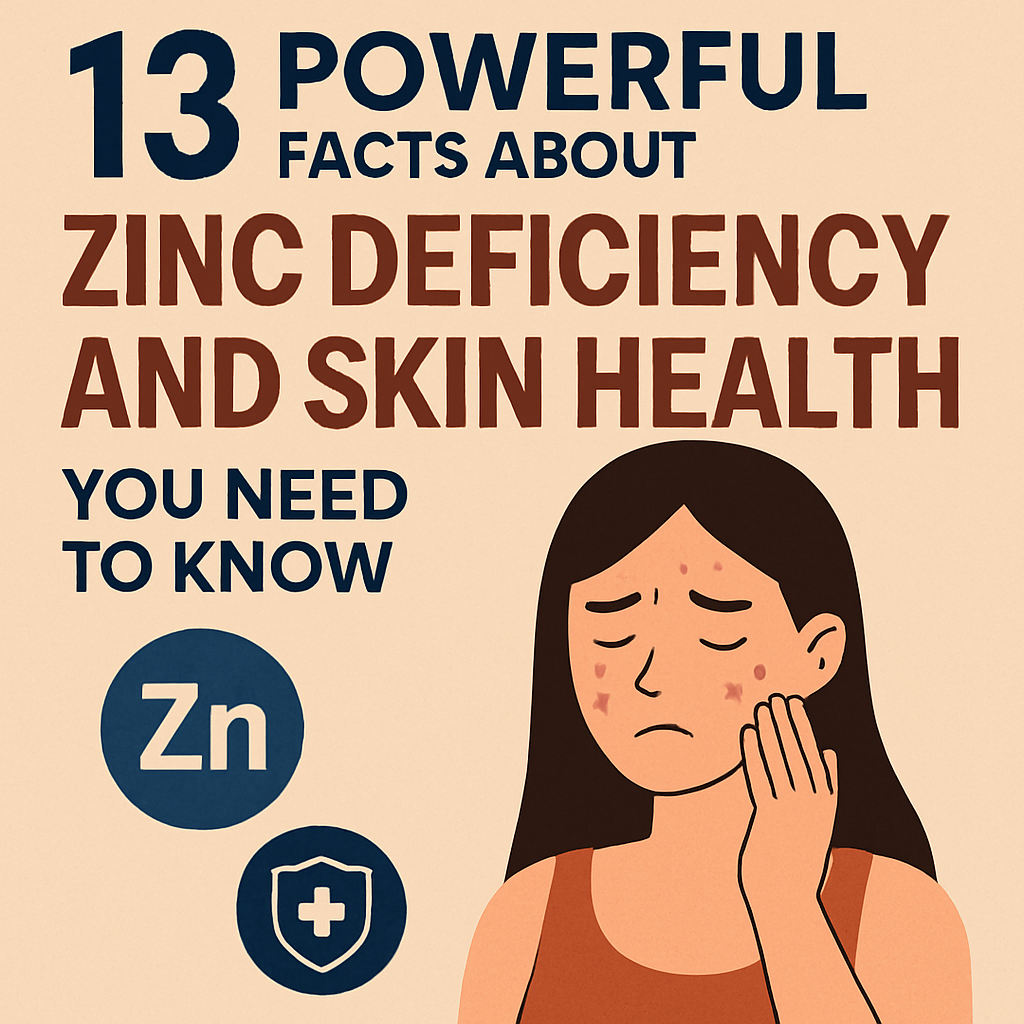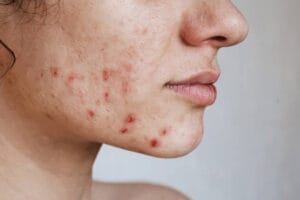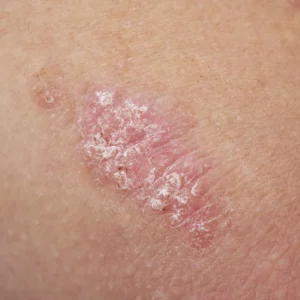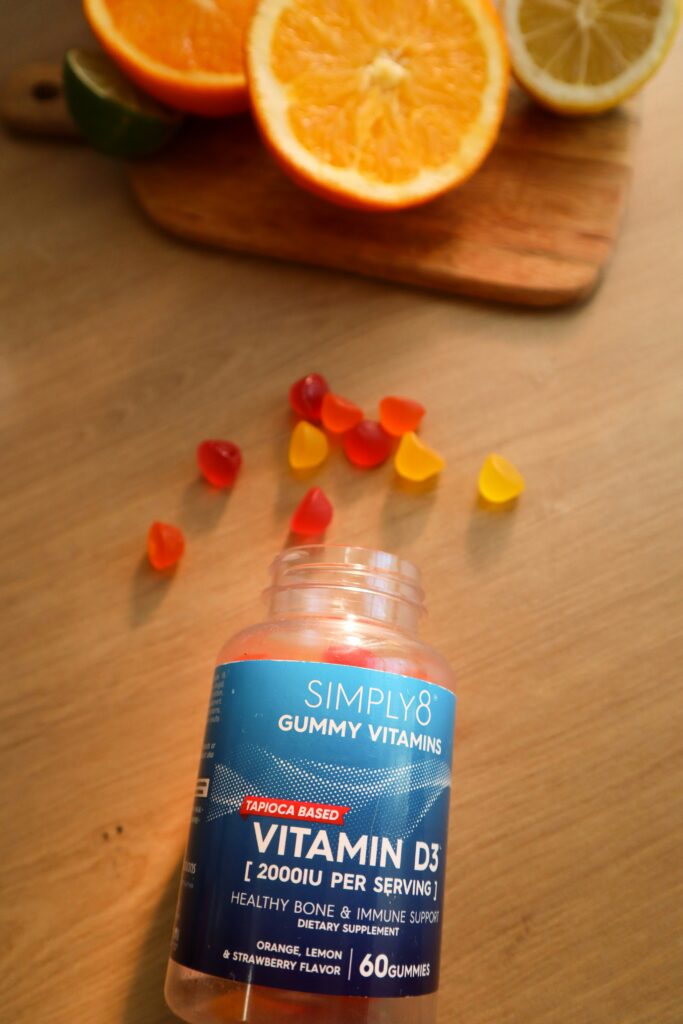
⚠️ Affiliate Disclaimer: This post may contain affiliate links, which means I may earn a small commission — at no extra cost to you — if you make a purchase through one of these links. I only recommend products or services I genuinely trust and believe can provide value. Thank you for supporting My Medical Muse!
13 Powerful Facts About Zinc Deficiency and Skin Health You Need to Know
Zinc Deficiency, Skin and Immune Health: The Overlooked Link You Can’t Afford to Miss
Zinc might not get as much spotlight as vitamin C or iron, but this trace mineral is a behind the scenes, a powerhouse for your health. From wound healing to immune defense and glowing skin, zinc plays an essential role in keeping your body resilient. Unfortunately, zinc deficiency is more common than many realize, especially in those with restricted diets, chronic illness, or poor gut health.
In this post, we’ll dive deep into how zinc deficiency affects your skin and immune system, what causes it, how to recognize the signs, and most importantly, how to restore optimal levels naturally. Whether you’re someone dealing with frequent acne, stubborn rashes, low immunity, or just chronic fatigue and poor healing, this guide will shed light on zinc’s often overlooked but critical role.
Table of Contents:
- 1. Why Zinc Matters: A Brief Overview
- 2. How Zinc Supports Healthy Skin
- 3. Zinc and the Immune System
- 4. Common Causes of Zinc Deficiency
- 5. Warning Signs of Zinc Deficiency
- 6. Zinc Deficiency and Skin Conditions
- 7. How to Test for Zinc Deficiency
- 8. Top Natural Zinc-Rich Foods
- 9. Should You Supplement with Zinc?
- 10. Tips to Optimize Zinc Absorption
- 11. Who is Most at Risk of Zinc Deficiency?
- 12. 1-Day Zinc-Rich Meal Plan
- 13. Quick FAQ: Zinc Deficiency Essentials
- 14. Final Thoughts: Rebalancing Your Body Naturally
Why Zinc Matters: A Brief Overview
Zinc is an essential trace element involved in over 300 enzymatic reactions in the human body. Despite its small presence, its functions are massive:
- Supports wound healing
- Maintains skin barrier integrity
- Regulates immune cell function
- Aids in DNA synthesis
- Promotes normal growth and development
- Balances hormones and mood
Zinc also supports cellular repair, helps metabolize carbohydrates, proteins, and fats, and acts as a co-factor in enzyme function. It influences everything from your metabolism to your sense of taste and smell. Your body doesn’t store zinc efficiently, so you need a consistent daily supply, without enough zinc, even minor injuries can linger, your immune system might falter, hormones may fall out of balance, and you become more vulnerable to infections, fatigue, and chronic inflammation.
How Zinc Supports Healthy Skin
Your skin is your body’s largest organ, and zinc is vital to keeping it strong and clear. Here’s how zinc works its magic on the skin:
Boosts Collagen Production: Zinc acts as a co-factor for collagen synthesis. Collagen is the structural protein that keeps your skin firm, elastic, and youthful. A deficiency in zinc can reduce collagen production, accelerating the appearance of wrinkles and sagging skin.
Fights Acne and Blemishes: Zinc has anti-inflammatory and antibacterial properties. It reduces the activity of oil glands, suppresses the bacteria Propionibacterium acnes, and calms irritated skin. Zinc supplementation has been shown to reduce acne severity, especially in those resistant to topical treatments.
A study published in Dermatologic Therapy found that oral zinc supplements improved acne in over 70% of participants.
Accelerates Wound Healing: Zinc contributes to the proliferation of keratinocytes and fibroblasts, two types of skin cells essential for healing. Without adequate zinc, wounds take longer to close and are more prone to infection.
Maintains Skin Barrier: Zinc helps in the formation of tight junctions in the skin, maintaining its barrier function. This barrier is crucial in preventing dehydration, allergens, and harmful microbes from penetrating the skin.
Soothes Skin Inflammation: Zinc helps regulate inflammatory cytokines and oxidative stress in the skin. This makes it particularly useful in managing flare-ups of inflammatory conditions like eczema, rosacea, and seborrheic dermatitis.
Zinc and the Immune System:
Zinc is a key modulator of the immune system, impacting both the innate (first-line defense) and adaptive (long-term memory) arms of immunity.
T-Cell Activation: Zinc is vital for the development and activation of T-lymphocytes, the white blood cells responsible for identifying and destroying pathogens and cancerous cells.
Antioxidant Support: Zinc stabilizes cell membranes and protects against oxidative damage by neutralizing harmful free radicals. This antioxidant role is crucial for immune cells, which produce reactive oxygen species to kill pathogens.
Regulates Inflammation: Zinc balances the inflammatory response by modulating the release of pro-inflammatory cytokines. It prevents the immune system from going into overdrive, a state seen in autoimmune disorders or cytokine storms.
Antiviral Properties: Zinc has demonstrated the ability to inhibit the replication of several viruses, including rhinoviruses (common cold) and even some coronaviruses. This is why zinc lozenges are popular during flu season.
Common Causes of Zinc Deficiency
Several factors can cause or contribute to zinc deficiency:
- Poor dietary intake: Zinc is mostly found in animal products, plant-based diets can fall short.
- Phytate consumption: Phytic acid in grains and legumes binds zinc and reduces absorption.
- Digestive disorders: Celiac disease, Crohn’s, IBS, and leaky gut impair nutrient absorption.
- Alcohol abuse: Alcohol increases urinary zinc excretion and inhibits absorption.
- Pregnancy and breastfeeding: Increased demands may not be met through diet alone.
- Medications: Diuretics, PPIs, and oral contraceptives can interfere with zinc levels.
- Chronic illness: Infections, diabetes, cancer, and kidney disease increase zinc loss.
Warning Signs of Zinc Deficiency
Symptoms can be subtle at first but often become more obvious over time. Key signs include:
- Frequent infections or colds.
- Delayed wound healing.
- Chronic skin issues (eczema, acne, dryness).
- Loss of appetite.
- Loss of taste or smell.
- White spots or lines on nails.
- Brittle hair or hair loss.
- Depression, mood swings, or brain fog.
- Diarrhea or gastrointestinal complaints.
- Hormonal imbalances (especially in women).
In children, zinc deficiency can result in stunted growth and delayed sexual maturation.
Zinc Deficiency and Skin Conditions
Let’s take a closer look at specific skin issues linked to low zinc levels:
Acne Vulgaris:

Zinc reduces sebum production, bacteria, and inflammation, all three key components of acne. Topical and oral zinc treatments have both shown benefits.
Eczema (Atopic Dermatitis):
Zinc supports the skin’s moisture barrier and reduces itchiness, inflammation, and microbial colonization, common in eczema-prone skin.
Psoriasis:

By modulating cell turnover and immune activity, zinc may help reduce scaling and inflammation associated with psoriasis
Perioral Dermatitis:
This facial rash often worsens with micronutrient imbalances. Zinc helps reduce redness and irritation.
Ulcers and Chronic Wounds:
Zinc supports angiogenesis (formation of new blood vessels), making it crucial for healing diabetic ulcers and pressure sores.
How to Test for Zinc Deficiency
While no single test is definitive, a combination of the following can help:
Plasma/Serum Zinc: A direct measurement but easily affected by infection, time of day, or meals.
Hair Mineral Analysis: Reflects long-term status, some practitioners use it to spot trends.
Zinc Tally Test: A taste test using liquid zinc; if you don’t taste bitterness within 30 seconds, you may be deficient.
Clinical Evaluation: Symptoms, dietary history and risk factors can be strong indicators.
Top Natural Zinc-Rich Foods
Focus on high-bioavailability sources such as:
- Oysters: The richest known source
- Beef, lamb, turkey: Especially red meat
- Pumpkin seeds, hemp seeds, sesame seeds.
- Cashews, almonds
- Chickpeas, lentils, kidney beans
- Egg yolks
- Mushrooms, quinoa
- Spinach, kale, asparagus
Light steaming boosts zinc availability in plant foods. Avoid overcooking meats to preserve zinc.
Should You Supplement with Zinc?
Supplementation may be necessary in moderate to severe deficiency or for those with higher needs.
Form Notes:
- Zinc Picolinate or Citrate: Highly absorbable and gentle on the stomach.
- Zinc Gluconate: Common in cold remedies and lozenges
- Zinc Monomethionine: Paired with amino acids for better uptake
Safe Daily Dose Guide
- Adults: 8-11 mg/day (RDA)
- Therapeutic range: 15-30 mg/day short-term
- Upper safe limit: 40 mg/day
Avoid long-term high doses without medical supervision, it can deplete copper and impair immunity.
Tips to Optimize Zinc Absorption
- Eat zinc-rich meals with protein
- Avoid tea, coffee, dairy with meals, they inhibit zinc.
- Soak/sprout grains and legumes
- Take zinc supplements on an empty stomach (if tolerated)
- Separate zinc from calcium or iron supplements
Who is Most at Risk of Zinc Deficiency?
- Vegans and vegetarians
- Pregnant and lactating women
- Children and teenagers
- Older adults
- People with chronic illness (diabetes, IBS, etc.)
- Alcoholics
- Athletes or heavy exercisers
1-Day Zinc-Rich Meal Plan
Here’s a sample day to boost your zinc naturally.
Meal What to Eat:
- Breakfast: Scrambled eggs with spinach, whole-grain toast and almonds.
- Lunch: Grilled turkey breast with quinoa salad and chickpeas.
- Snack: Pumpkin seeds and a boiled egg.
- Dinner: Beef stir-fry with broccoli, mushrooms, and brown rice.
- Optional: Zinc lozenge if you’re fighting a cold.
Quick FAQ: Zinc Deficiency Essentials
Can low zinc cause hair loss?
- Yes, zinc is critical for follicle health and cell turnover. Deficiency may cause thinning, shedding, or brittle hair.
Is zinc safe for daily use?
- Yes, within safe limits. Stick to under 40 mg daily unless directed otherwise by your doctor.
Can I take zinc with other vitamins?
- Avoid combining zinc with calcium or iron at the same time. Take them at least 2 hours apart.
Can zinc help my acne?
- Absolutely. Zinc reduces oil production, inflammation, and acne-causing bacteria.
How long does it take to fix a deficiency?
- Mild deficiency can improve within 2-4 weeks of proper supplementation and diet.
Final Thoughts: Rebalancing Your Body Naturally
Zinc deficiency can silently disrupt your skin integrity, immune resilience, energy, mood, and even hormonal balance. It may not be as trendy as collagen or probiotics, but it’s arguably just as essential.
By embracing zinc-rich foods, improving your gut health, understanding your risk factors, and supplementing responsibly when needed, you can restore optimal function to your immune system and skin. Your body gives you clues, listen to them.
👩⚕️ Need Personalized Health Advice?
Get expert guidance tailored to your unique health concerns through MuseCare Consult. Our licensed doctors are here to help you understand your symptoms, medications, and lab results—confidentially and affordably.
👉 Book a MuseCare Consult NowRelated Post:
- 21 Subtle Signs of Iron Deficiency Anemia in Teenage Girls
- 17 Sneaky Clues on How to Tell If You Have Iron Deficiency Without a Blood Test
- Correct Iron Deficiency with Food Fast: Expert Timeline + 7-Day Meal Plan
- 7 Stool Colors That Could Signal Iron Deficiency
- Iron Supplement Side Effects: What You Need to Know Before You Start.




